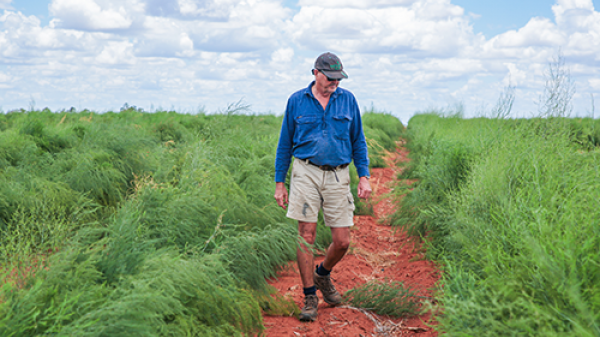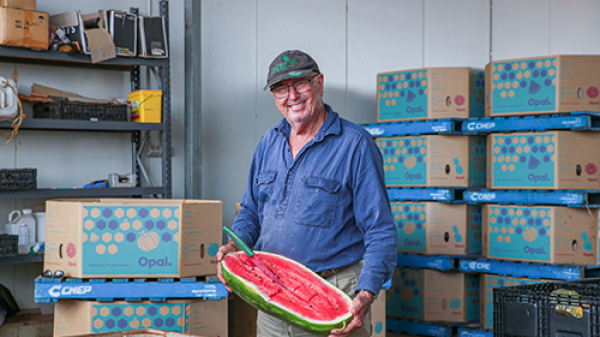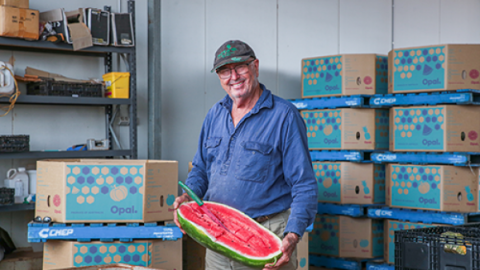The family farming enterprise specialising in watermelon and asparagus has been able to continue pioneering the North Queensland horticulture industry with a North Queensland Restocking, Replanting and On-Farm Infrastructure co-contribution grant less than two years since the monsoon trough weather event.
Owner Jon Caleo said without a North Queensland Restocking, Replanting and On-Farm Infrastructure Grant, administered through the Queensland Rural and Industry Development Authority (QRIDA) on behalf of the Australian Government, the operation would likely not have recovered.
“Our business would probably not be in operation now if it was not for the grant, we would be struggling,” he said.
“It wasn’t a choice, it was a necessity. If we hadn’t accessed the grant we probably would not be in production today.
“There are 20 people who would not be employed and there would be cows running on this ground.”

Jon said infrastructure including roads and 200 acres of watermelons were destroyed in the disaster – both were replaced with the North Queensland Restocking, Replanting and On-Farm Infrastructure Grant.
“The replanting and infrastructure grant helped us in two specific ways,” he said.
“It helped us buy plastic and seeds and plant the crops and get them back in the ground.
“The infrastructure element has helped us mainly with roads; 99% of what we lost was roads and in the case of the home farm, it was a bridge which was totally washed away.
“The things the grant was designed to replace is exactly what we needed it for. We didn’t need it for anything else. That’s where it was targeted and that’s where it helped us.”
Jon said the assistance meant he was able to continue normal business operations and prepare for long-term business resilience.
“It allowed us to plant and get the farm back going,” he said.
“Then we were able to start repairs.”
He said the application process came with on-farm support.
“It’s been quite easy to do, QRIDA has been very helpful and the people I have had to deal with personally have also been very helpful,” he said.
“Elizabeth (QRIDA’s Regional Area Manager in Townsville) has been very helpful to come and help us do it.
“They are people who come and sit with you at the table, have a cup of tea and help you through it. That makes it easy, otherwise it could be a bit daunting for some growers. Those on-hand people are very helpful.”

Growing a family farming enterprise
Black River Produce includes two farms in North Queensland, 20kms east of Charters Towers on the Burdekin River and a second farm 20km north of Townsville.
What started as a pawpaw, zucchini and capsicum farm exporting to New Zealand has developed over the past three decades to stand as one of the most significant vegetable cropping businesses in the region.
“We grow watermelons for eight months of the year, pumpkins for 12 months, asparagus for four months, broccoli for four months and we’re experimenting with some garlic,” Jon said.
“Farming started out as a hobby at Black River and it was a hobby that grew out of control.
“These new crops came about because the farm was quarantined with cucumber green mottle mosaic virus which came in an imported seed in 2015 so we needed to start looking around for other crops that weren’t affected by the virus.
“I was interested in asparagus because it had not been grown in Queensland before, not any further north than Mildura and it’s something we still don’t know will work, it’s still an experiment.”
Plans are in place to increase the asparagus production and substitute domestic retailers’ dependence on Mexican imports with locally-grown produce.
“If the plans come to fruition the whole farm will be asparagus,” Jon said.
“The farm is going well. Our asparagus is doubling production every year, melons are going well, prices are quite high this year.
“The farm is back on its feet and close to where it should have been before we had the flood.”
For more information about these grants visit the North Queensland Restocking, Replanting and On-farm Infrastructure Grant webpage.
